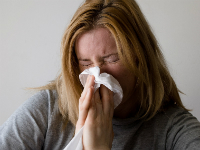
Illnesses such as diarrhoea/vomiting and flu-like illness are common at this time of year. They are usually self-limiting and, for most people, can be easily treated at home.
General hygiene
The spread of most infectious illnesses is reduced through good hand hygiene. Please ensure that you and your child wash your hands frequently with warm water and soap, particularly after using the toilet, after using a tissue to catch a cough or sneeze, and before eating.
Influenza (flu)
Flu and flu-like viruses spread easily between people from coughs and sneezes. They can live on hands and surfaces for up to 24 hours. Symptoms of flu may develop quickly and can include:
• Sudden fever
• Dry, chesty cough
• Sore throat
• Aching body
• Headache
• Tiredness • Diarrhoea or tummy pain
• Nausea
For most healthy people flu is an unpleasant but self-limiting illness. However, some people can be more at risk of developing severe illness or complications including the following groups:
• those aged 65 years or over
• pregnant women
• those with a long-term medical condition – for example, diabetes or a heart, lung, kidney or neurological disease
• those with a weakened immune system – for example, because of chemotherapy or HIV
• those resident in long term care facilities
If you or your child are in an at-risk group AND develop symptoms of flu, please seek prompt medical assessment via NHS 111, by a GP or a nurse who will be able to provide further advice.
If you or your child are in an at-risk group AND have not had the seasonal flu jab AND are concerned that you or your child have had contact with someone with flu, please seek prompt medical assessment via NHS 111, by a GP or nurse.
If you or your child are not in an at-risk group but develop flu like illness and are concerned about your symptoms, please consult NHS 111, your GP or nurse in the normal way.
Staff members and pupils should not attend school or other communal settings if they have symptoms of flu and should only return once they have recovered.
The flu vaccine is the best form of protection that we have against influenza (flu). There are several strains of flu and even if there has been illness at school, the vaccine may offer further protection against other strains of flu.
Please continue to engage in the school-based immunisation programme and to attend mop-up clinics if your child misses the scheduled sessions due to illness.
Toddlers aged two and three, children and adults who are in risk groups for flu (including those aged 65 years and over, pregnant women, people with long term medical conditions or weakened immune systems) should attend their GP or pharmacy for vaccination as soon as possible if they have not already been vaccinated.
For more information about any of the above and advice about treating flu please visit https://www.nhs.uk/conditions/flu/
Viral gastrointestinal illnesses
It is not uncommon for viruses which cause vomiting and diarrhoea to circulate among children (for example norovirus, also known as the ‘winter vomiting bug’).
If pupils or staff members develop vomiting or diarrhoea, it is important that they stay off school and away from other communal settings until 48 hours after they last had diarrhoea or vomiting. As always, please contact NHS 111 or your GP if you are concerned about your child’s illness.
Further information, including advice on treatment, can be found at : https://www.nhs.uk/conditions/diarrhoea-and-vomiting/
School closures
Public Health England does not routinely advise that schools close when pupils and staff are affected by diarrhoea / vomiting or flu-like illness; this is because the viruses that cause illness are circulating in the community, so children will continue to be exposed to them even if not at school.
However, schools may need to close for other reasons e.g. not enough staff to safely stay open, or closing for a short time to allow a deep clean of the school buildings.
Any decision about school closure will be taken by school management and any enquiries should be addressed to the school.
